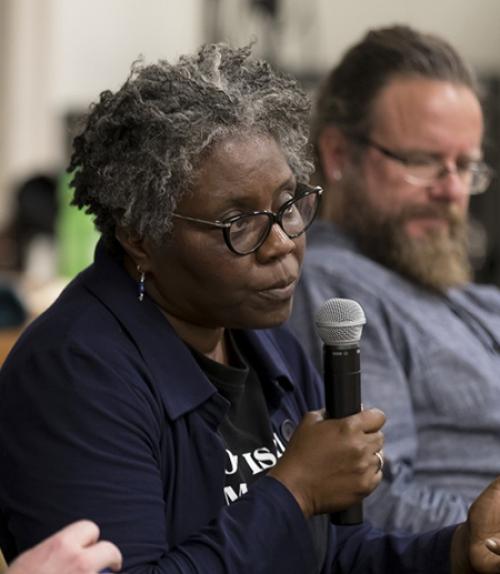The study of the history of capitalism at Cornell is fueled by insightful, big-picture questions, many of which were raised during the Nov. 15 roundtable discussion, “From Slavery to Trade, From Segrenomics to the Gig Economy: Approaches to the History of Capitalism at Cornell.”
“Can democracy and capitalism survive? Can the economy be based on something besides extraction, besides enslavement, oppression and war?” asked Louis Hyman in his opening statement. “These are questions we should be asking ourselves as we think about the future of capitalism and the history of capitalism.”
For most of the history of capitalism, the panelists noted, those who benefited were members of the white ruling class. Would it be possible to construct a capitalism based on inclusivity?
For interdisciplinary scholar Noliwe Rooks, who sees white supremacy (not racism) inextricably intertwined with capitalism, the answer is no. “Capitalism is a system but also an ideology,” said Rooks, professor of Africana studies. “How do you tell the story of those on whom the house of capitalism has fallen? ‘How does capitalism shape your world’ is not a question that always makes it into academia.”
Slavery, and the end of slavery, is deeply entwined with the history of capitalism. “Some came to believe that ending slavery would be an economic benefit because it’s not an efficient form of capital and they were ready to submit all their moral calculations to economic ones,” said panelist Edward Baptist, professor of history. “But attitudes about slavery were driven by many factors that can’t be disentangled from cultural and economic ones.” He described the histories of capitalism, finance and slavery as parts of a Venn diagram that often overlap.
“Is there a capitalism that’s not based on stealing land or people?” asked Hyman, associate professor in the ILR School and director of ILR’s Institute for Workplace Studies. “I’m more optimistic than my colleagues, because the engine of capitalism today is not based on slavery.”
But panelist Sandra Greene pointed out that the unregulated capitalism today has resulted in a massive gap of have and have nots, a situation that has arisen before. “What do you do with profits? Right now, there is no redistribution. How is society to be ordered? The wealthy didn’t achieve their status all by themselves; they benefited from societal goods, like roads. Do you pay back what society itself enabled you to achieve?” said Greene, the Stephen ’59 and Madeline ’60 Anbinder Professor of African History and chair of the Department of History.
“One way of understanding the history of capitalism is the continuous discovery of new things people, areas, concepts, ideas to be turned into market goods,” said Baptist, pointing to Facebook as an example. “What is capitalism but a continuous series of finding new frontiers or bodies or land to be disrupted, things that are not market goods to be seized in one way or another and turned into market goods?”
Cornell’s History of Capitalism initiative is a collaboration between the Department of History in the College of Arts and Sciences, the ILR School, and faculty in other departments and programs across Cornell. The Nov. 15 roundtable, moderated by history postdoctoral associate Adrienne Bitar, was part of the American Studies’ Fall Colloquium series, “The History of Capitalism: New Approaches.”




